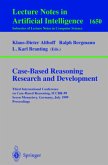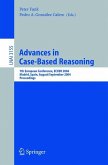Topics in Case-Based Reasoning
First European Workshop, EWCBR-93, Kaiserslautern, Germany, November 1-5, 1993. Selected Papers
Mitarbeit:Wess, Stefan; Althoff, Klaus-Dieter; Richter, Michael
Topics in Case-Based Reasoning
First European Workshop, EWCBR-93, Kaiserslautern, Germany, November 1-5, 1993. Selected Papers
Mitarbeit:Wess, Stefan; Althoff, Klaus-Dieter; Richter, Michael
- Broschiertes Buch
- Merkliste
- Auf die Merkliste
- Bewerten Bewerten
- Teilen
- Produkt teilen
- Produkterinnerung
- Produkterinnerung
This volume presents the 36 full refereed papers selected from the presentations at the First European Workshop on Case-Based Reasoning, held at Kaiserslautern, Germany in November 1993. Case-based reasoning (CBR) has recently attracted much interest among AI researchers: it supports knowledge acquisition and problem solving, and it is related to machine learning, analogical reasoning, cognitive modeling, similarity, and information retrieval. EWCBR is now established as the prime European forum for CBR research. This volume reflects the importance of this dynamic area of research through…mehr
Andere Kunden interessierten sich auch für
![Case-Based Reasoning Research and Development Case-Based Reasoning Research and Development]() VelosoCase-Based Reasoning Research and Development77,99 €
VelosoCase-Based Reasoning Research and Development77,99 €![Case-Based Reasoning Research and Development Case-Based Reasoning Research and Development]() LeakeCase-Based Reasoning Research and Development77,99 €
LeakeCase-Based Reasoning Research and Development77,99 €![Developing Industrial Case-Based Reasoning Applications Developing Industrial Case-Based Reasoning Applications]() Ralph BergmannDeveloping Industrial Case-Based Reasoning Applications39,99 €
Ralph BergmannDeveloping Industrial Case-Based Reasoning Applications39,99 €![Advances in Case-Based Reasoning Advances in Case-Based Reasoning]() HatonAdvances in Case-Based Reasoning39,99 €
HatonAdvances in Case-Based Reasoning39,99 €![Case-Based Reasoning Research and Development Case-Based Reasoning Research and Development]() Klaus-Dieter Althoff / Ralph Bergmann / L. Karl Branting (eds.)Case-Based Reasoning Research and Development77,99 €
Klaus-Dieter Althoff / Ralph Bergmann / L. Karl Branting (eds.)Case-Based Reasoning Research and Development77,99 €![Advances in Case-Based Reasoning Advances in Case-Based Reasoning]() Peter Funk / Pedro A. González Calero (eds.)Advances in Case-Based Reasoning77,99 €
Peter Funk / Pedro A. González Calero (eds.)Advances in Case-Based Reasoning77,99 €![Advanced Topics in Artificial Intelligence Advanced Topics in Artificial Intelligence]() AntoniouAdvanced Topics in Artificial Intelligence39,99 €
AntoniouAdvanced Topics in Artificial Intelligence39,99 €-
-
-
This volume presents the 36 full refereed papers selected from the presentations at the First European Workshop on Case-Based Reasoning, held at Kaiserslautern, Germany in November 1993.
Case-based reasoning (CBR) has recently attracted much interest among AI researchers: it supports knowledge acquisition and problem solving, and it is related to machine learning, analogical reasoning, cognitive modeling, similarity, and information retrieval. EWCBR is now established as the prime European forum for CBR research. This volume reflects the importance of this dynamic area of research through essential contributions to all aspects of CBR research and advanced applications.
Case-based reasoning (CBR) has recently attracted much interest among AI researchers: it supports knowledge acquisition and problem solving, and it is related to machine learning, analogical reasoning, cognitive modeling, similarity, and information retrieval. EWCBR is now established as the prime European forum for CBR research. This volume reflects the importance of this dynamic area of research through essential contributions to all aspects of CBR research and advanced applications.
Produktdetails
- Produktdetails
- Lecture Notes in Computer Science 837
- Verlag: Springer / Springer Berlin Heidelberg / Springer, Berlin
- Artikelnr. des Verlages: 978-3-540-58330-1
- 1994.
- Seitenzahl: 488
- Erscheinungstermin: 26. August 1994
- Englisch
- Abmessung: 235mm x 155mm x 27mm
- Gewicht: 618g
- ISBN-13: 9783540583301
- ISBN-10: 3540583300
- Artikelnr.: 09248493
- Herstellerkennzeichnung
- Springer-Verlag GmbH
- Tiergartenstr. 17
- 69121 Heidelberg
- ProductSafety@springernature.com
- Lecture Notes in Computer Science 837
- Verlag: Springer / Springer Berlin Heidelberg / Springer, Berlin
- Artikelnr. des Verlages: 978-3-540-58330-1
- 1994.
- Seitenzahl: 488
- Erscheinungstermin: 26. August 1994
- Englisch
- Abmessung: 235mm x 155mm x 27mm
- Gewicht: 618g
- ISBN-13: 9783540583301
- ISBN-10: 3540583300
- Artikelnr.: 09248493
- Herstellerkennzeichnung
- Springer-Verlag GmbH
- Tiergartenstr. 17
- 69121 Heidelberg
- ProductSafety@springernature.com
Dr. Michael Richter promovierte am Institut für Allgemeine Wirtschaftsforschung, Abteilung für Empirische Wirtschafts- und Sozialforschung, der Albert-Ludwigs-Universität Freiburg und arbeitete während dieser Zeit bei der Freiburg Wirtschaft und Touristik GmbH & Co.KG sowie bei der Wirtschaftsregion Freiburg e.V.
Understanding creativity: A case-based approach.- Analogical asides on case-based reasoning.- PRODILOGY/ANALOGY: Analogical reasoning in general problem solving.- A knowledge level model of knowledge-based reasoning.- Learning prediction of time series. A theoretical and empirical comparison of CBR with some other approaches.- Case-based and symbolic classification.- A Similarity metric for retrieval of cases imperfectly explained.- Similarity measures for structured representations.- A rule-based similarity measure.- An underlying memory model to support case retrieval.- Massively parallel case-based reasoning with probabilistic similarity metrics.- Similarity evaluation between observed behaviours for the prediction of processes.- Using k-d trees to improve the retrieval step in case-based reasoning.- Explanation-based similarity: A unifying approach for integrating domain knowledge into case-based reasoning for diagnosis and planning tasks.- Structural similarity as guidance in case-based design.- Retrieving adaptable cases.- Adaptation through interpolation for time-critical case-based reasoning.- Knowledge engineering requirements in derivational analogy.- Incorporating (Re)-interpretation in case-based reasoning.- PBL: Prototype-based learning algorithm.- Explanation-driven case-based reasoning.- A reflective architecture for integrated memory-based learning and reasoning.- A hybrid knowledge-based system for technical diagnosis learning and assistance.- Tuning rules by cases.- Using case-based reasoning to focus model-based diagnostic problem solving.- A logical representation for relevance criteria.- Multiple explanation patterns.- The application of case-based reasoning to the tasks of health care planning.- A priori selection of mesh densities for adaptive finite element analysis, using a case-based reasoning approach.- Integrating semantic structure and technical documentation in case-based service support Systems.- Case-based information retrieval.- Case-based reasoning for network management.- Case-based reasoning in a simulation environment for biological neural networks.- Integrated case-based building design.- Case-deliverer: Making cases relevant to the task at hand.- A first study on case-based planning in organic synthesis.
Understanding creativity: A case-based approach.- Analogical asides on case-based reasoning.- PRODILOGY/ANALOGY: Analogical reasoning in general problem solving.- A knowledge level model of knowledge-based reasoning.- Learning prediction of time series. A theoretical and empirical comparison of CBR with some other approaches.- Case-based and symbolic classification.- A Similarity metric for retrieval of cases imperfectly explained.- Similarity measures for structured representations.- A rule-based similarity measure.- An underlying memory model to support case retrieval.- Massively parallel case-based reasoning with probabilistic similarity metrics.- Similarity evaluation between observed behaviours for the prediction of processes.- Using k-d trees to improve the retrieval step in case-based reasoning.- Explanation-based similarity: A unifying approach for integrating domain knowledge into case-based reasoning for diagnosis and planning tasks.- Structural similarity as guidance in case-based design.- Retrieving adaptable cases.- Adaptation through interpolation for time-critical case-based reasoning.- Knowledge engineering requirements in derivational analogy.- Incorporating (Re)-interpretation in case-based reasoning.- PBL: Prototype-based learning algorithm.- Explanation-driven case-based reasoning.- A reflective architecture for integrated memory-based learning and reasoning.- A hybrid knowledge-based system for technical diagnosis learning and assistance.- Tuning rules by cases.- Using case-based reasoning to focus model-based diagnostic problem solving.- A logical representation for relevance criteria.- Multiple explanation patterns.- The application of case-based reasoning to the tasks of health care planning.- A priori selection of mesh densities for adaptive finite element analysis, using a case-based reasoning approach.- Integrating semantic structure and technical documentation in case-based service support Systems.- Case-based information retrieval.- Case-based reasoning for network management.- Case-based reasoning in a simulation environment for biological neural networks.- Integrated case-based building design.- Case-deliverer: Making cases relevant to the task at hand.- A first study on case-based planning in organic synthesis.









